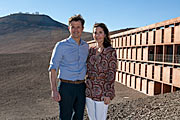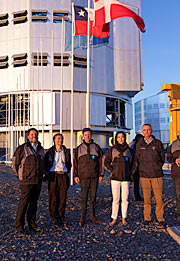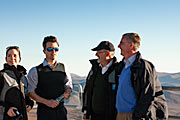Press Release
The Crown Prince Couple of Denmark visits ESO's Paranal Observatory
15 March 2013
On 14 March 2013 His Royal Highness The Crown Prince of Denmark, accompanied by his wife, Her Royal Highness The Crown Princess, visited ESO’s Paranal Observatory, as part of an official visit to Chile. They were taken on a tour of ESO’s world-leading astronomical facilities on Paranal by ESO’s Director General, Tim de Zeeuw.
The Crown Prince Couple of Denmark visited ESO’s Paranal Observatory during their official visit to Chile. The Observatory is located 130 kilometres south of Antofagasta, in the heart of Chile’s Atacama Desert, the driest desert in the world. At a height of 2635 metres above sea level, Paranal is the site of the Very Large Telescope (VLT), the world’s most advanced optical instrument dedicated to astronomical research.
On arrival, The Crown Prince Frederik and The Crown Princess Mary were welcomed by ESO’s Director General, Tim de Zeeuw, who introduced them to ESO’s cutting-edge research. Their Royal Highnesses, accompanied by Danish Foreign Minister Villy Søvndal and Danish ambassador in Chile Lars Steen Nielsen, then toured the facilities, first discovering Paranal’s award-winning Residencia which houses the staff on location, and then going on to visit the telescopes themselves, at the summit of Cerro Paranal. From the platform where the telescopes are located they watched Paranal’s famous sunset, a special tradition for staff on duty before starting their night shift.
During the visit, HRH The Crown Prince said: “It’s a pleasure to be visiting such an exclusive and leading scientific facility. The work done here is truly outstanding. As Danes, we are proud to be participating in this endeavour.”
The Director General added: “We are very honoured to receive the Crown Prince Couple here on Paranal and to introduce them to our work. Denmark is a valued and long-standing Member State and I take this opportunity to thank the Prince and Princess on behalf of ESO for the continued strong support for our programme from Denmark. I am particularly pleased that this visit coincides with Denmark taking a key step towards joining the European Extremely Large Telescope programme”.
The couple spent the night at Paranal and after dinner they went outside to enjoy the stellar Paranal skies through a 50-cm hobby telescope set up by ESO optical engineer Stephane Guisard. Two Danes, ESO’s Senior Advisor for International Relations, Claus Madsen, and the Head of education and Public Outreach, Lars Lindberg Christensen, presented the Royal Couple with signed copies of the two books they authored for ESO’s 50th anniversary.
Denmark was the first country to join the original five founding Member States of ESO (Belgium, France, Germany, the Netherlands and Sweden) in 1967, and has since contributed to major discoveries at ESO (see Danish involvement in ESO).
More information
ESO is the foremost intergovernmental astronomy organisation in Europe and the world’s most productive ground-based astronomical observatory by far. It is supported by 15 countries: Austria, Belgium, Brazil, Czechia, Denmark, France, Finland, Germany, Italy, the Netherlands, Portugal, Spain, Sweden, Switzerland and the United Kingdom. ESO carries out an ambitious programme focused on the design, construction and operation of powerful ground-based observing facilities enabling astronomers to make important scientific discoveries. ESO also plays a leading role in promoting and organising cooperation in astronomical research. ESO operates three unique world-class observing sites in Chile: La Silla, Paranal and Chajnantor. At Paranal, ESO operates the Very Large Telescope, the world’s most advanced visible-light astronomical observatory and two survey telescopes. VISTA works in the infrared and is the world’s largest survey telescope and the VLT Survey Telescope is the largest telescope designed to exclusively survey the skies in visible light. ESO is the European partner of a revolutionary astronomical telescope ALMA, the largest astronomical project in existence. ESO is currently planning the 39-metre European Extremely Large optical/near-infrared Telescope, the E-ELT, which will become “the world’s biggest eye on the sky”.
Links
- Photos of the VLT
- Videos of the VLT
- The book: The Jewel on the Mountaintop (PDF file)
- The book: Europe to the Stars (PDF file)
Contacts
Lars Lindberg Christensen
ESO education and Public Outreach Department
Garching bei München, Germany
Tel: +49-89-3200-6761
Cell: +49-173-3872-621
Email: lars@eso.org
Massimo Tarenghi
ESO Representative in Chile
Santiago, Chile
Tel: +56 2 463 3143
Email: mtarengh@eso.org
About the Release
| Release No.: | eso1314 |
| Name: | Paranal, Site visit, Very Large Telescope |
| Type: | Unspecified : Technology : Observatory Unspecified : People |
| Facility: | Very Large Telescope |
Our use of Cookies
We use cookies that are essential for accessing our websites and using our services. We also use cookies to analyse, measure and improve our websites’ performance, to enable content sharing via social media and to display media content hosted on third-party platforms.
ESO Cookies Policy
The European Organisation for Astronomical Research in the Southern Hemisphere (ESO) is the pre-eminent intergovernmental science and technology organisation in astronomy. It carries out an ambitious programme focused on the design, construction and operation of powerful ground-based observing facilities for astronomy.
This Cookies Policy is intended to provide clarity by outlining the cookies used on the ESO public websites, their functions, the options you have for controlling them, and the ways you can contact us for additional details.
What are cookies?
Cookies are small pieces of data stored on your device by websites you visit. They serve various purposes, such as remembering login credentials and preferences and enhance your browsing experience.
Categories of cookies we use
Essential cookies (always active): These cookies are strictly necessary for the proper functioning of our website. Without these cookies, the website cannot operate correctly, and certain services, such as logging in or accessing secure areas, may not be available; because they are essential for the website’s operation, they cannot be disabled.
Functional Cookies: These cookies enhance your browsing experience by enabling additional features and personalization, such as remembering your preferences and settings. While not strictly necessary for the website to function, they improve usability and convenience; these cookies are only placed if you provide your consent.
Analytics cookies: These cookies collect information about how visitors interact with our website, such as which pages are visited most often and how users navigate the site. This data helps us improve website performance, optimize content, and enhance the user experience; these cookies are only placed if you provide your consent. We use the following analytics cookies.
Matomo Cookies:
This website uses Matomo (formerly Piwik), an open source software which enables the statistical analysis of website visits. Matomo uses cookies (text files) which are saved on your computer and which allow us to analyze how you use our website. The website user information generated by the cookies will only be saved on the servers of our IT Department. We use this information to analyze www.eso.org visits and to prepare reports on website activities. These data will not be disclosed to third parties.
On behalf of ESO, Matomo will use this information for the purpose of evaluating your use of the website, compiling reports on website activity and providing other services relating to website activity and internet usage.
Matomo cookies settings:
Additional Third-party cookies on ESO websites: some of our pages display content from external providers, e.g. YouTube.
Such third-party services are outside of ESO control and may, at any time, change their terms of service, use of cookies, etc.
YouTube: Some videos on the ESO website are embedded from ESO’s official YouTube channel. We have enabled YouTube’s privacy-enhanced mode, meaning that no cookies are set unless the user actively clicks on the video to play it. Additionally, in this mode, YouTube does not store any personally identifiable cookie data for embedded video playbacks. For more details, please refer to YouTube’s embedding videos information page.
Cookies can also be classified based on the following elements.
Regarding the domain, there are:
- First-party cookies, set by the website you are currently visiting. They are stored by the same domain that you are browsing and are used to enhance your experience on that site;
- Third-party cookies, set by a domain other than the one you are currently visiting.
As for their duration, cookies can be:
- Browser-session cookies, which are deleted when the user closes the browser;
- Stored cookies, which stay on the user's device for a predetermined period of time.
How to manage cookies
Cookie settings: You can modify your cookie choices for the ESO webpages at any time by clicking on the link Cookie settings at the bottom of any page.
In your browser: If you wish to delete cookies or instruct your browser to delete or block cookies by default, please visit the help pages of your browser:
Please be aware that if you delete or decline cookies, certain functionalities of our website may be not be available and your browsing experience may be affected.
You can set most browsers to prevent any cookies being placed on your device, but you may then have to manually adjust some preferences every time you visit a site/page. And some services and functionalities may not work properly at all (e.g. profile logging-in, shop check out).
Updates to the ESO Cookies Policy
The ESO Cookies Policy may be subject to future updates, which will be made available on this page.
Additional information
For any queries related to cookies, please contact: pdprATesoDOTorg.
As ESO public webpages are managed by our Department of Communication, your questions will be dealt with the support of the said Department.






